Maori culture tour of New Zealand with Contiki! Rotorua hot springs, haka dance, Atticus Finch restaurant.

Kia ora! When I embarked on my Contiki tour of New Zealand, I was especially excited to see the native Maori culture. Their Sun and Steam journey covers the entire North Island, with an emphasis on cultural experiences.
On this stop of the tour, I’ll take you around the town of Rotorua, a historical home for the indigenous people of Aotearoa.
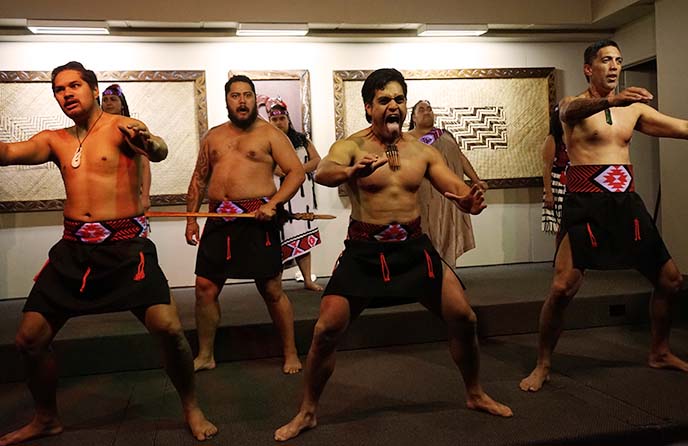
I even got to see a Haka war dance, where the Maori men stomped their feet and made intimidating faces, with tongues thrust out!
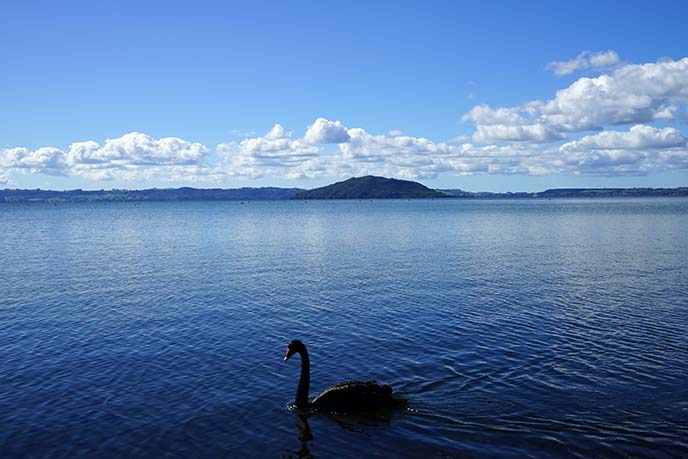
From the glowworm caves of Waitomo, the Contiki bus took less than two hours to reach Rotorua. This charming little city is located on the shores of Lake Rotorua, home to black swans (yes, these creatures really exist).

The Maori settled here centuries ago, due to the unique geothermal landscape. Rotorua’s hot, bubbling springs provided natural heat. The thermal mud pools were also an easy way to cook food (in the hangi style) — and today, they lend themselves to natural spa treatments.

The lake itself is not sulphuric. Rotorua has charming parks and gardens, and it’s a pleasure to stroll around the pier.
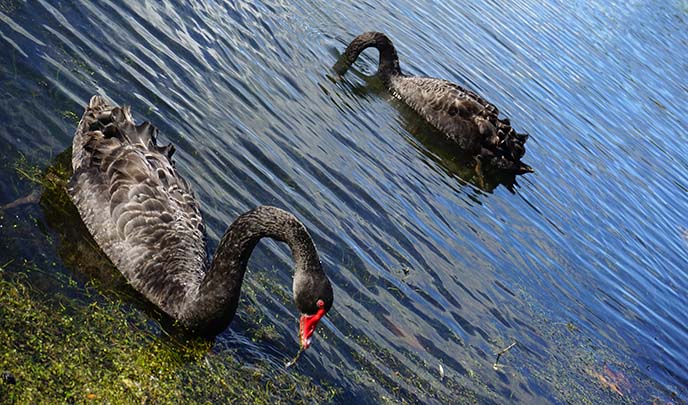
I couldn’t take my eyes off these black swans with red beaks. They were hunted to extinction in New Zealand, but later reintroduced from Australia.
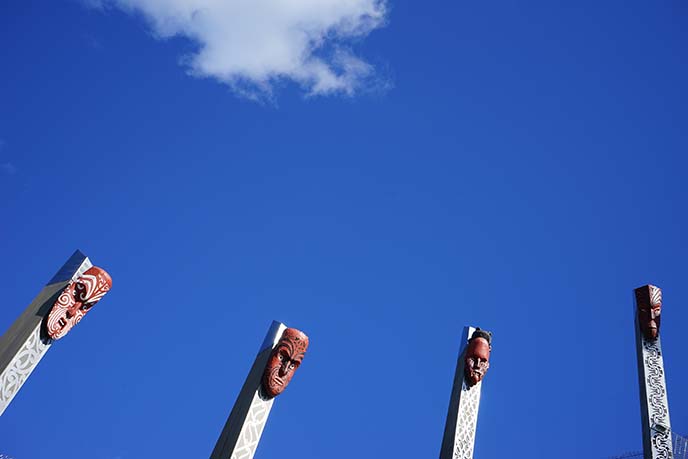
My Contiki bus drove to the Te Puia cultural centre, in the Whakarewarewa valley, for a group activity. This is the home of the New Zealand Maori Arts and Crafts Institute, and a famous erupting geyser.
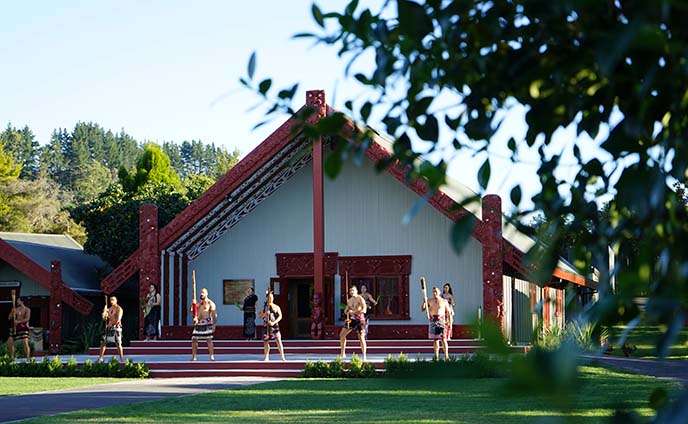
Contiki tours have a number of included activities, which let you bond with others on the bus. (They also offer plentiful “me-time” on the itinerary, so you can explore whatever you want, at your own pace.)
We split into teams for an “Amazing Race” around Te Puia. We had to complete funny tasks and piece together clues, before time ran out.
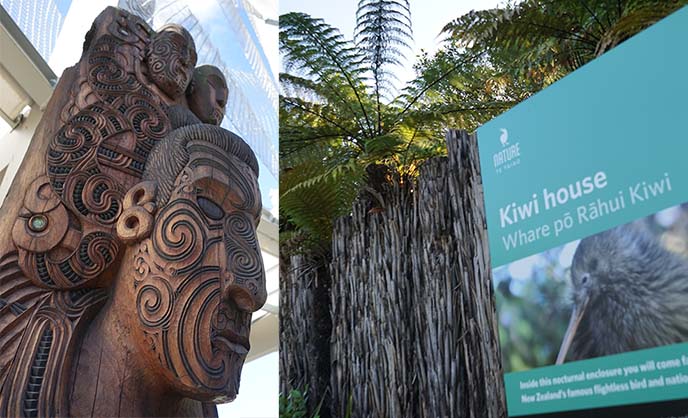
The Amazing Race took us to a hut, where local artisans showed us how to do Maori weaving and wood carving. At the Kiwi house, we saw the cute little flightless birds who are the national symbol of New Zealanders.
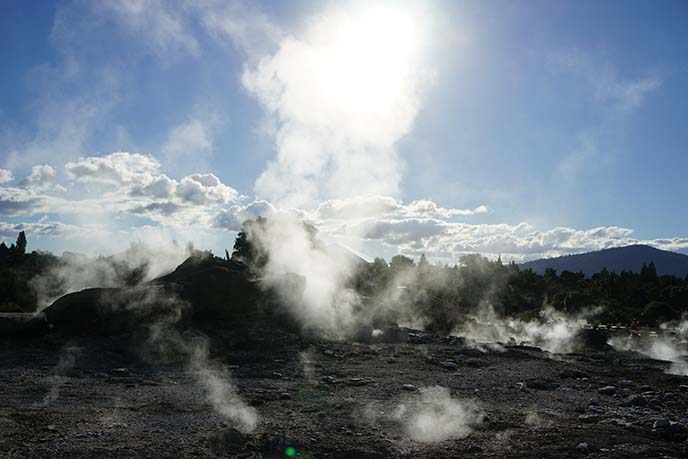
At the center of the park is Pohutu Geyser, which means “Big Splash.” This is the Whakarewarewa Thermal Valley for a reason: the geyser spurts up to twenty times per day, and can reach 30 meters in height.

The bubbling mud flats created an otherworldly landscape.
(I’m wearing a black fringe skirt, similar to this longer skirt and shorter fringe skirt. My black cut-out apocalyptic top is by Michi )
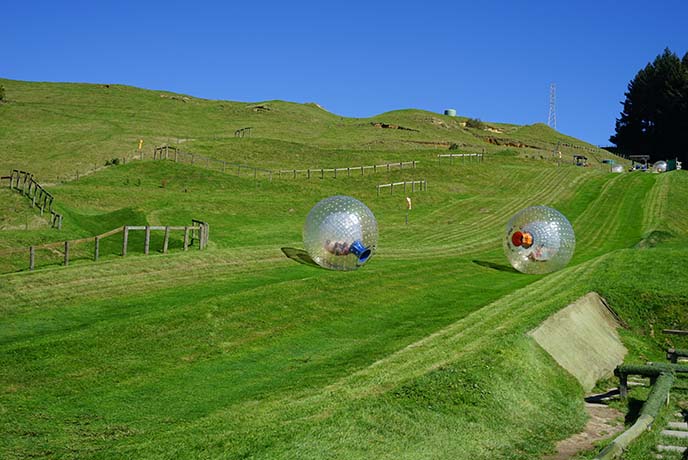
Some of the friends on my Contiki tour took part in Ogo, which you might know as “Zorb.” Essentially, you climb into a giant plastic ball with water in it, and roll down the hill! Zorbing isn’t for me, but I enjoyed watching others take part in this amusing activity.
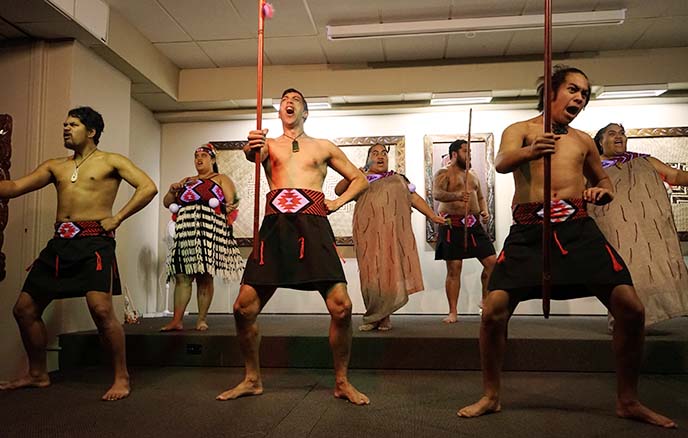
Back at Sudima Hotel, the group congregated for a special dinner: a hangi feast. All of the food was cooked underground, using the natural geothermal steam. My favorite items from the buffet were the kumara (a type of sweet potato only found here), fish, and a gooey bread pudding type of dessert.
Then, a group of Māori dancers took the stage to perform the Haka, or ancestral war cry. They stamped their feet, bulged out their eyes, and extended their tongues while making big, frightening expressions. The haka serves to intimidate opponents, but also to make the performer feel powerful, and commemorate special occasions. The dancers later invited the men in the audience to try out the movements for themselves!
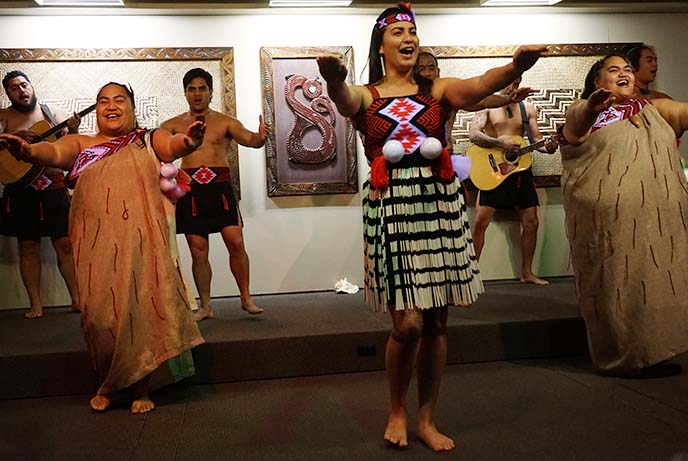
Some of the performances were women-only. In this “poi dance,” the ladies swung around a ball on a string, creating patterns and rhythms in the air. I tried to do this on stage, and ended up hitting myself in the face…
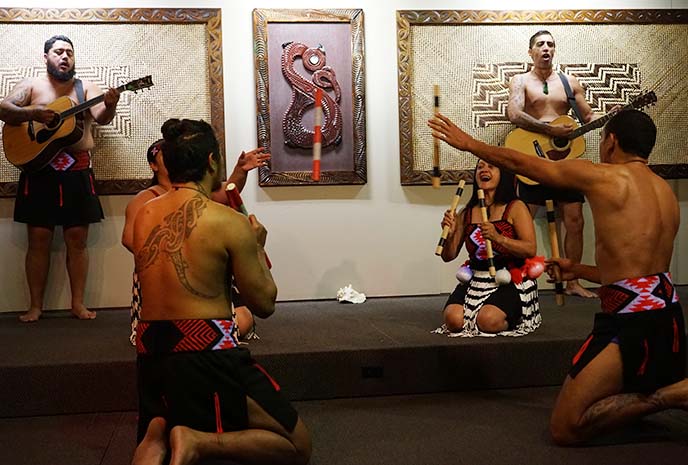
Everyone took part in the Ti Rakau or Tititorea, also known as the Māori Stick Game. This involves the rhythmic throwing and catching of sticks, from one person to another.

I had another delightful meal at Zippy Cafe in Rotorua. Still dreaming of their New Zealand flat white (microfoam steamed milk over espresso) and Moroccan salad.

Zippy is a cute mascot from a local kid’s show. At the back of the cafe, he stands in a Super Mario themed mural.

New Zealand wines are much-coveted these days. I suggest trying local varietals while you’re here, since many are not expoted out. I quite liked The Ned Pinot Gris, which has a rose-like tint.

Rotorua has an “Eat Street” district, filled with international restaurants. This area uses a geothermal heating underlay to keep the outdoor patios warm all year round.
On the way over, we passed a food trucks fair. Rotorua truly is a foodie city.

One of the highest-rated restaurants in town is Atticus Finch. (Address: 1106 Tutanekai St, Eat Streat, Rotorua)
The restaurant is named after the famous lawyer in Harper Lee’s novel, “To Kill a Mockingbird.” (Both the book and the movie starring Gregory Peck are wonderful.)
(I’m wearing a fringe skirt and shirt by Michi.)
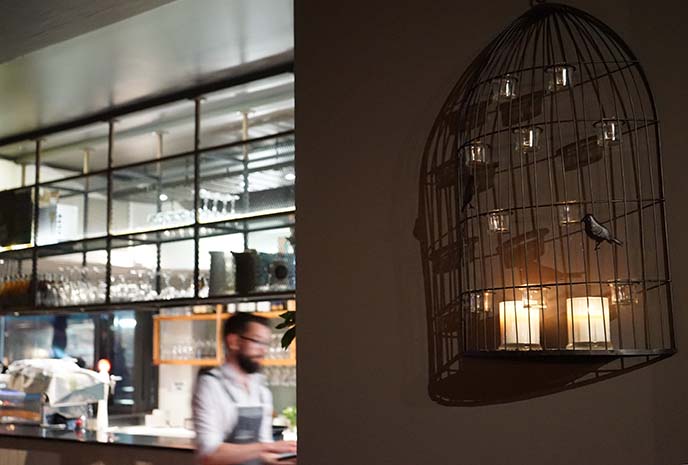
Local sisters Cherry and Kay strove to make Atticus Finch a lively dining experience for groups of friends, with an open kitchen and huge heated patio. The bird cage, filled with candles, hints at the literary inspiration.

Atticus Finch’s cocktails are standouts, made from fresh fruits and herbs. The dinner menu is designed for sharing; everything is made from scratch, with carefully selected ingredients.
Quite a few items are vegetarian and gluten free. I loved the handmade gnocchi, seasoned with date puree, spinach and almonds.

One of the walls displays a quote by Atticus Finch, from the book. He’s known for his words of wisdom and tolerance, such as: “If you can learn a simple trick, Scout, you’ll get along a lot better with all kinds of folks. You never really understand a person until you consider things from his point of view, until you climb inside of his skin and walk around in it.”
All of the dishes were clean, yet tasty — often with an Asian fusion influence. I recommend the unique haloumi cheese salad with broccoli, rocket, sunflower seeds and cranberries. You can’t leave without ordering the Chargrilled Kumara (local sweet potato), seasoned with smoked cashew orange chili.

As for dessert, the photos speak for themselves. Lemon and almond cake, with red wine poached pears, mint and citrus accents. The perfect way to end my time in Rotorua.

And this photo sums up the fun I had on my Contiki tour of New Zealand! It was fantastic to meet 18-35 year olds from all walks of life, and living in different countries.
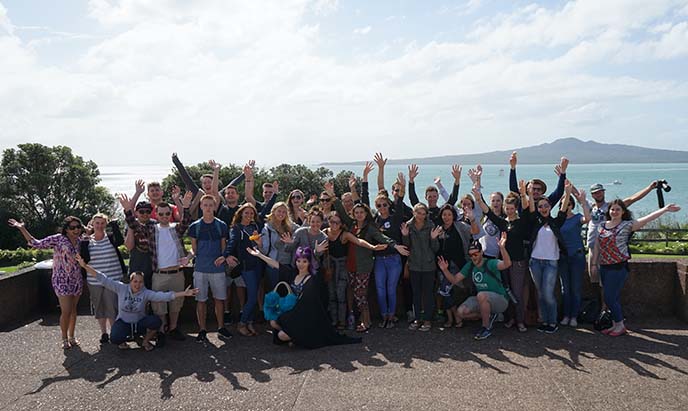
We gathered for a Contiki tour group photo, at this viewpoint near Auckland.
(Photos by Salima Remtulla and La Carmina)

I confess that at first, I wasn’t sure if I would enjoy a group bus tour. Contiki, however, is not your typical travel company.
The tours are tailored to millennials, and give plenty of free time. I wouldn’t have been able to see so much of New Zealand’s North Island in a week, if it weren’t for them.

If you’re planning on traveling somewhere, especially alone, I encourage you to check out Contiki. They have tours for all types of interests and budgets, in destinations worldwide.
PS: if you’d like more New Zealand travel tips, check out all my NZ posts here.
PPS: I’m currently in six countries all around Europe — check my social media @lacarmina (linked on the right sidebar) to see the latest updates!
SHARE & COMMENT
Princess Fairytale castles of Sintra, Portugal! Quinta da Regaleira, Palacio da Pena.
Life update is long overdue… I’m sure you have sensed that a lot has been happening!
Read on for a recap, plus my next destinations for the summer: I’ll be in six exciting new countries.
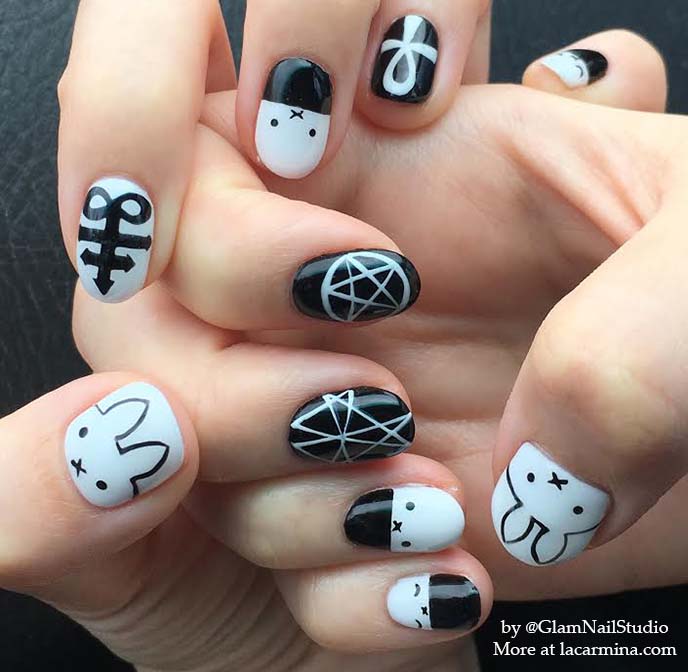
After back-to-back trips during the first half of the year, I spent some downtime in Vancouver, working on my new Depop shop. This is a project I’ve wanted to tackle for a long time, but I never had the time until now. It’s been wonderful to connect with so many of you, and I love seeing photos of you receiving packages from me!
(If you’re not sure what I’m referring to: I’m selling most of my wardrobe here, come check it out. Lots of Japanese Lolita, Goth and Harajuku fashion, Miffy kawaii clothing and more, at discount prices. Simply take a look at the listings, then email me and let me know what you’d like!)

Time to get packing again, as I’m off to travel to six countries. (All the details at the bottom of this post).
But first, let me complete my love-letter to Portugal — with a day-trip to the royal palaces of Sintra. I dressed up as a purple princess, and wandered through breathtaking fairytale castles.

Most tourists come from Lisbon to see Sintra’s most famous sight, Palácio da Pena, which bears resemblance to the Walt Disney castle.
But by far, my team and I preferred a lesser known palace, Quinta da Regaleira (pictured in these photos). Come inside with me, and I’ll show you why.
(By the way – my dress and princess sleeves are available for sale, on my Depop shop. Email me if you’d like to get them.)
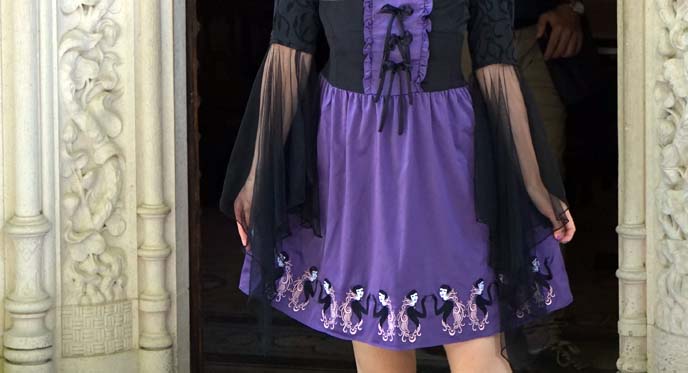
First, the must-know travel information. How do you get to Sintra? From Lisbon (Lisboa), you can drive or take a bus, but the easiest method is taking a 30-minute train ride. Our Eurail train passes came in handy for this short trip, since we could simply hop in and ride.
Sintra is a popular destination, and can be packed with tourists. I recommend visiting during weekdays and off-peak seasons if possible, to avoid the crowds. Tickets are required to enter and lineups can be long, so look into getting advance passes (we had press access thanks to Visit Lisbon.)
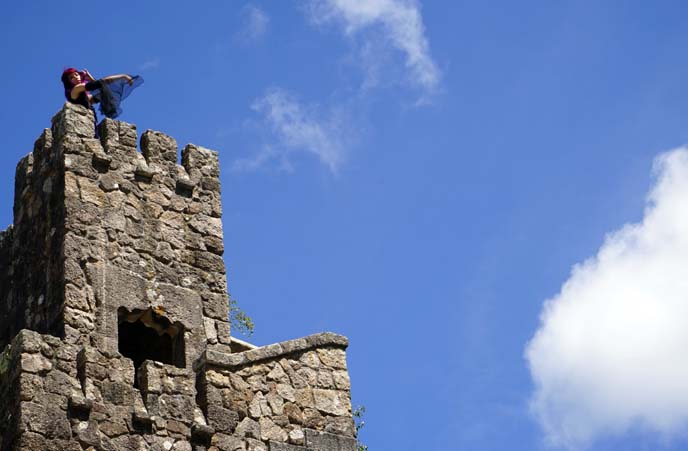
If you visit only one attraction in Sintra, let it be the elegant 19th century palace: Quinta da Regaleira.
As you walk through the gardens, you’ll feel as if you’re a princess from a storybook fantasy.

The grounds of Quinta da Regaleira are enormous, and not as frequented by tourists — giving you free rein to explore.
Like in a storybook, I wandered through mysterious forest paths. I crossed a lake laden with stones, and ducked into a maze of tunnels. At the top of this stone tower, I pretended to be Rapunzel letting down my hair!

Commissioned by “Monteiro the millionaire,” the architecture is a tribute to Gothic-Renaissance romance. His estate and chapel are teeming with gargoyles, pinnacles and other ornamentation.
Adding to the enigma: we spotted Masonic symbols inside the church, such as an eye in a pyramid.

Monteiro was a Freemason, and built underground “Iniciatic wells” for secret rituals such as the Tarot initiation.
Standing inside the narrow and damp pit and looking up at the light, you can feel the solemnity of these rites.

Quinta da Regaleira’s famous “wells” are more like inverted towers. A 27-meter spiral staircase winds around the structure like a snail.

The stories of the Knights Templar are alive, in this Portuguese palace hidden with symbols and secrets. (Photography by Borderless Media)

Romantic and dramatic… Quinta da Regaleira palace in Sintra is well worth the trip.
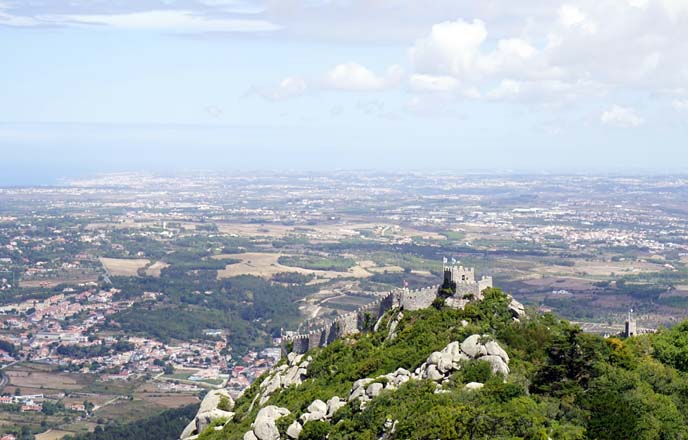
Sintra has many other historic sights, from museums to the hotel room where Lord Byron stayed.
We took in this soaring view of Castelo dos Mouros (Moorish Castle), which was built in the 10th century by the Moors. (Remember when I visited the most famous Moors palace, The Alhambra in Spain?)

Sintra’s most popular attraction is Palácio da Pena. It was constructed in the 19th century by Dom Fernando II, as a summer palace for the royal family.
Many say Walt Disney based his Magic Kingdom castle on this one (although there are other European palaces that claim to be his inspiration). Palacio da Pena does have a Disney-esque feeling, which I admit wasn’t to my taste… this Poseidon statue felt like the entrance to a theme ride, especially with the line of tourists waiting to go inside.

To me, the palace was like a painted movie set. It was difficult to enjoy the visit when there were so many tourists around. In fact, we could hardly take a photo without a dozen heads poking out from the balconies.
I think you can sense the different feeling of these palaces from the photos alone. For my team and me, Quinta da Regaleira was a far better experience.
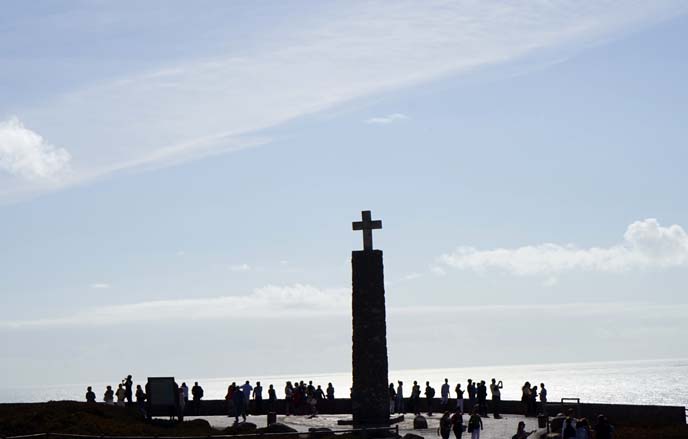
On the way back to Lisbon, we stopped at the western-most point of Portugal, Cabo da Roca. This cliff edge is a popular viewpoint, high above the crashing waves.

We also stopped by the Monument to the Discoveries in Belém, which celebrates the explorers that led the Age of Discovery. Near this statue, a map shows former Portuguese colonies around the world, including Goa, Macau and Brazil.

My travel filmmakers and I got back to Lisbon in time for a spectacular light show, which was projected onto the Rua Augusta Arch.

Lisbon has a tremendous energy. A crowd gathered in front of the landmark, and DJs played electronic beats while lasers swept through the sky.

With music and narration, the light show told a legend of how Lisbon was founded. We watched animation and film footage flow over the archway, depicting the love story of Ulysses and Ophiussa.

The 3D projection mapping was impressive, especially when each architectural detail seemed to move and crumble. At one point, the “Glory” statue at the top of the arch turned into a disco dancer, and gave her best Travolta impression!

Finally, we had a midnight snack at Mercado da Ribeira market. This modern, indoor space is brimming with food and drink vendors, serving all types of cuisine. I longed to try a bite from every stand…
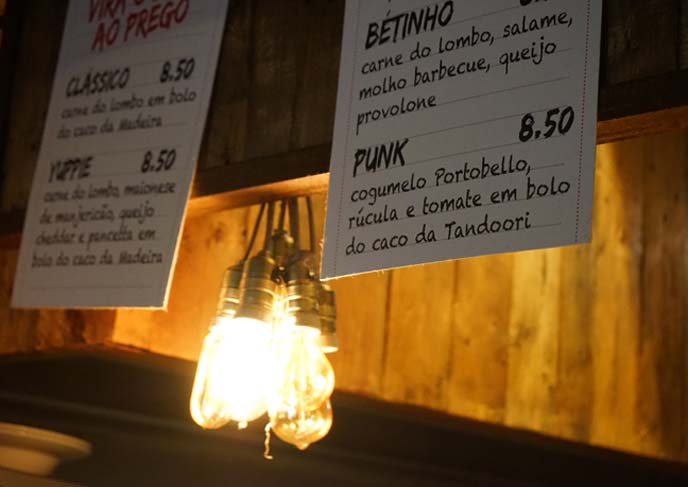
There’s a vibe here similar to that of food trucks: young indie chefs, experimenting with dishes and using the best local ingredients. I had several types of sardines, black rice, gooey sponge cake…
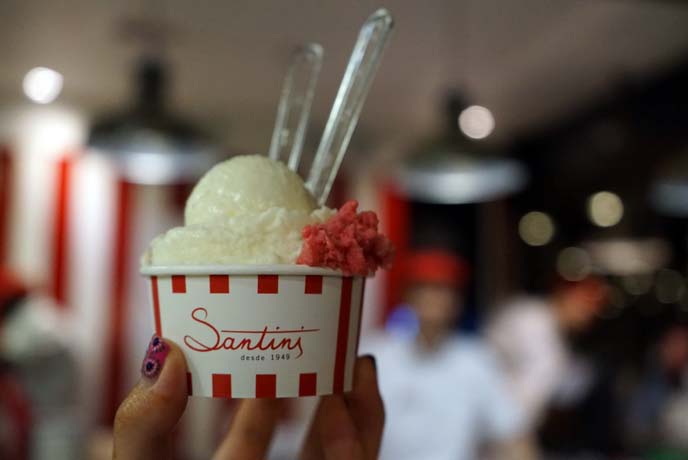
… and the best coconut gelato of my life, at Santini Gelati. This family has been making ice cream since 1949, and their creations are celebrated as the best in Portugal (if not the world).
Come see more of my Lisbon travel tips here. Portugal is now one of my favorite European countries, and I regret not visiting sooner.

And now, I’m off on the road again. My travel film / photo team and I are working with Visit Slovenia, on a project in Ljubljana! I’ll also be stopping in the Netherlands (including Utrecht and the Miffy Museum, a dream come true). And we’ll be all over Scandinavia, including Copenhagen, Helsinki, Stockholm and Tallinn. It’ll be my first time in these Nordic countries, and I can’t wait.
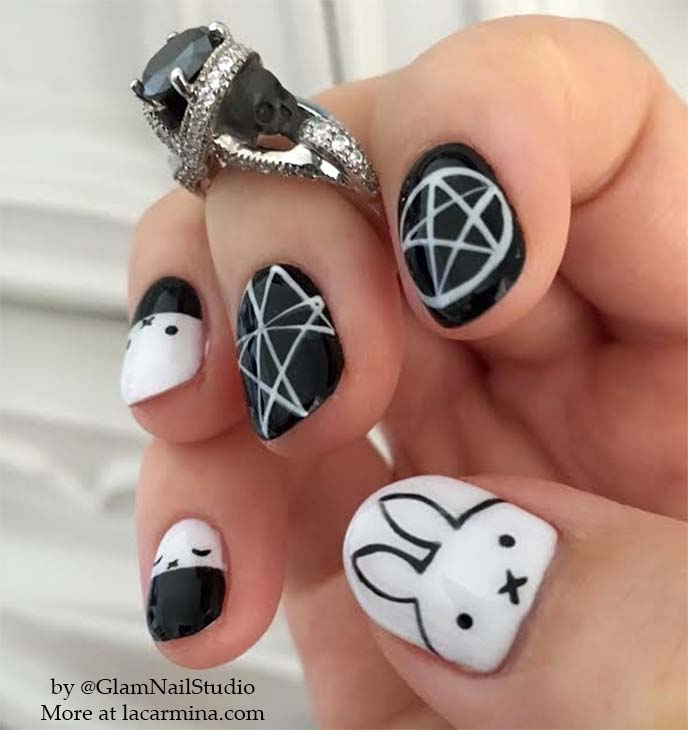
Starting today, I’ll be sharing these European escapades on my social media — stay tuned to my Instagram and Snapchat @lacarmina for lots of fun.
I got minimal Gothic Miffy nail art, to match the theme of the trip… Arigato Glam Nail Studio in Richmond, BC for the cute nails! They always do the most intricate, kawaii gel designs for me. (The skull and black diamond ring is by Sapphire Studios.)

And don’t forget to check out my big wardrobe sale! Just added lots of new items to my shop – including Gothic Lolita dresses, Miffy fashion and some of my best clothing from Tokyo.
Check out all the listings here and email me (gothiccarmina att gmail dotcom) with a list of items that you’d like to get. I can gladly calculate exact shipping for you, and do discounts on bundle packages. Please don’t feel shy about writing to me! It would be a pleasure to send you designs from my personal collection. Talk soon!
Shop La Carmina’s Pastel Goth Jrock Kawaii closet sale now!
 LA CARMINA
LA CARMINA






